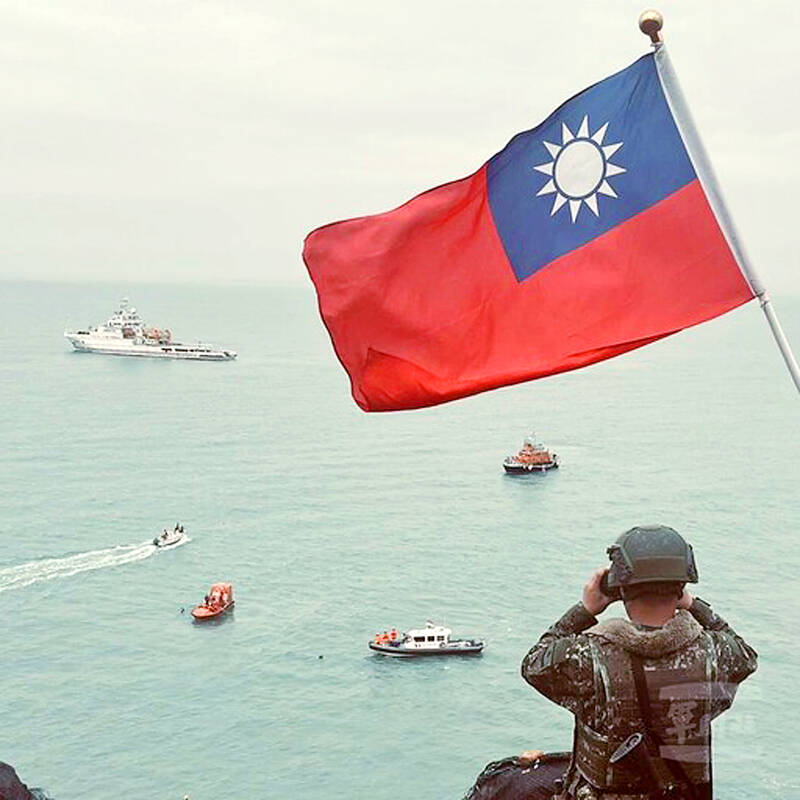Coast Guard Administration (CGA) personnel yesterday drove off four China Coast Guard patrol vessels that had entered restricted and prohibited waters off Kinmen County in the second such incident in less than 24 hours.
China has stepped up its military activities near Taiwan in the past few years, with almost daily incursions into its air defense identification zone.
CGA patrol vessels shadowed the Chinese ships, after they were detected at 8:54am, and broadcast warnings until they left the restricted waters at 10:06am, the administration said in a statement.

Photo: Screen grab from the Ministry of National Defense Spokesman’s Facebook page
“You have entered our country’s restricted waters. Please turn around immediately,” a Taiwanese official told the Chinese vessels via radio, video footage released yesterday by the CGA showed.
The footage shows a CGA boat tracking the movement of two Chinese ships in the near distance.
“The move has seriously impacted traffic and safety. To avoid triggering naval incidents, we urge them to stop such behavior,” the CGA said in a statement.
The Chinese vessels were told to leave less than 24 hours after four others were spotted in waters about 3 nautical miles (5.6km) south of Kinmen’s main island on Friday and were also driven off.
The China Coast Guard said in a statement on Friday that its ships were “legally” patrolling waters off Kinmen.
The restricted and prohibited waters in the area were set by the Ministry of National Defense in 1992. The term “prohibited waters” refers to territorial waters, while “restricted waters” refers to a contiguous zone — an area designated by states to bolster their law enforcement capacity in waters just outside their territorial seas, the CGA has said.
The prohibited zone around Kinmen County extends about 4km east, about 8km south and about halfway to the coast of China in the north and northeast.
Last month, the China Coast Guard began regular patrols around Kinmen, after two Chinese died while trying to flee CGA personnel after their boat had entered prohibited waters. Taipei has stressed the importance of cooperation between Taiwan and China amid heightened tensions.
Taiwan on Thursday sent its coast guard to join a rescue mission at China’s request after a Chinese fishing vessel capsized near Kinmen, and on Friday it dispatched several boats to help search for a Chinese fisher who fell overboard near Lienchiang County.
A senior Taiwanese security official, who asked to remain anonymous due to the sensitivity of the matter, told Reuters that Beijing is sending out “confusing” messages by continuing its harassment of Taiwan while asking for its assistance in dealing with maritime incidents.
The official said the latest moves by the China Coast Guard in Kinmen “did not carry substantial security threats,” but complicated the situation there.
“We are clueless,” the official said. “We tried to save their fishermen yesterday, and today they are baring their teeth and claws.”

US President Donald Trump yesterday announced sweeping "reciprocal tariffs" on US trading partners, including a 32 percent tax on goods from Taiwan that is set to take effect on Wednesday. At a Rose Garden event, Trump declared a 10 percent baseline tax on imports from all countries, with the White House saying it would take effect on Saturday. Countries with larger trade surpluses with the US would face higher duties beginning on Wednesday, including Taiwan (32 percent), China (34 percent), Japan (24 percent), South Korea (25 percent), Vietnam (46 percent) and Thailand (36 percent). Canada and Mexico, the two largest US trading

ACTION PLAN: Taiwan would expand procurement from the US and encourage more companies to invest in the US to deepen bilateral cooperation, Lai said The government would not impose reciprocal tariffs in retaliation against US levies, President William Lai (賴清德) said yesterday, as he announced five strategies to address the issue, including pledging to increase Taiwanese companies’ investments in the US. Lai has in the past few days met with administrative and national security officials, as well as representatives from various industries, to explore countermeasures after US President Donald Trump on Wednesday last week announced a 32 percent duty on Taiwanese imports. In a video released yesterday evening, Lai said that Taiwan would not retaliate against the US with higher tariffs and Taiwanese companies’ commitments to

‘SPECIAL CHANNEL’: Taipei’s most important tasks are to stabilize industries affected by Trump’s trade tariffs and keep negotiations with Washington open, a source said National Security Council Secretary-General Joseph Wu (吳釗燮) arrived in the US for talks with US President Donald Trump’s administration, a source familiar with the matter said on Friday. Wu was leading a delegation for a meeting known as the “special channel,” the Financial Times reported earlier. It marked Trump’s first use of the channel since returning to the White House on Jan. 20. Citing a source familiar with the matter, the Financial Times reported that Minister of Foreign Affairs Lin Chia-lung (林佳龍) was also a part of the delegation. The visit came days after China concluded war games around Taiwan and amid Trump’s

CHIP EXCEPTION: An official said that an exception for Taiwanese semiconductors would have a limited effect, as most are packaged in third nations before being sold The Executive Yuan yesterday decried US President Donald Trump’s 32 percent tariff on Taiwanese goods announced hours earlier as “unfair,” saying it would lodge a representation with Washington. The Cabinet in a statement described the pledged US tariffs, expected to take effect on Wednesday next week, as “deeply unreasonable” and “highly regrettable.” Cabinet spokeswoman Michelle Lee (李慧芝) said that the government would “lodge a solemn representation” with the US Trade Representative and continue negotiating with Washington to “ensure the interests of our nation and industries.” Trump at a news conference in Washington on Wednesday announced a 10 percent baseline tariff on most goods